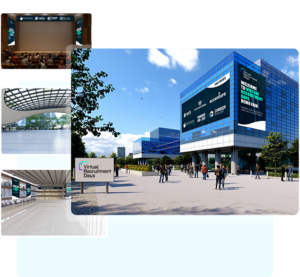Event planners have always looked for profitability and convenience in hosting a large gathering of people. In the recent past, we have witnessed a shift from in-person to virtual events. It altogether changed the face of human interaction and encouraged people to carry on with their activities in a safer online environment. However, post-pandemic, there’s a rise in hybrid events. Hybrid events are now considered the perfect solution for blending virtual and in-person events components. It is by far the most incredible approach that brings a global audience on board while also keeping face-to-face human interactions alive. Most organisations and companies today prefer hosting a global audience which is only possible either with virtual or hybrid events. Yet, planning virtual and hybrid events can be really challenging when it comes to integrating in-person and online audiences.
Let’s explore why it is important to plan virtual and hybrid events in 2023.
Why Host Virtual and Hybrid Events?
A virtual event only allows gathering people online. But with a hybrid event solution, a physical event is hosted in combination with a virtual element. This way, the remote audience gets a chance to join the event online without the need to travel to the venue. And likewise, a small gathering of people appear onsite. When combined, virtual and hybrid events bring tons of benefits. Here’s a list of reasons you should plan to host virtual or hybrid events.
Crossborder Reach
Isn’t it incredible that a person from the farthest part of the world joins an online meeting in a blink? Not only do they get to attend the meeting, but they also participate in a face-to-face video interaction. You know, with technology, it just keeps getting better and better. Now, with a virtual event solution, you can access a wider audience. It encompasses all boundaries and barriers when bringing people together on an online platform. Be it a virtual or hybrid event; the online accessibility feature makes it easier for people to join from the comfort of their homes. In fact, your keynote speakers scratch some time out of their busy schedules and address an online audience.
Affordable Solution
Event planning is not child’s play. But a virtual or hybrid event is a far more affordable solution compared to previously hosted grand expos or conferences. Event planners realise that physical events cost millions in planning and are a costly deal for the attendees. Plus, people always miss out on attending these events due to distance, money or time constraints. Although now, people across borders join virtual meetings and easily connect with business professionals.
Moreover, with everything happening online, we save on machinery, equipment, paperwork, venue rentals, food or transportation expenses. So you need not invest in large gatherings of people at a physical location. Instead, you can go hybrid and allow attendees to join either online or in person. Thanks to digital technology and software for simplifying human interaction.
Advanced Features
Compared to in-person mainstream gatherings, virtual platforms bring in tech and tools to spice up the online experience. For instance, virtual events allow keeping track of live analytics, be it attendance, human activity or interactions. Its automated system eases the process of attendee registration, online presence, and live interactions. Not just that, incorporating an online element into your in-person event allows you to surpass time and space constraints. Your attendee can simply log into their computer or mobile device to join a large gathering of people. Here, they are welcomed into an immersive 3D-designed virtual environment that may be a replica of a physical location.
A virtual platform allows you to fully custom-design the environment with complete branding. Further, the space is crowded with moving animated avatars, usually company representatives.
Exceptional Profitability
Have you wondered why more and more business processes and interactions are being held online? Or why are most businesses running virtually? Well, there is no denying that virtual events have changed the face of the corporate event industry. Nowadays, millions and billions worth of business deals are closed online. Corporate tycoons need not travel to a physical office location to conduct business. Instead, with a few clicks, people connect with industry professionals and network seamlessly. This not only saves them big bucks but also engages them in a safe environment.
Over the years, we have observed that online dealings are a great approach to cost cuttings. Interestingly, the event planners save on event planning and hosting expenses by running the event through a virtual events platform. Your overall revenue skyrockets with exceptional return on investments. So, be it a virtual or hybrid event, insane profitability is promised with a sure-shot success factor.
Learn more from a complete guide to hybrid events.
Tips to Plan Your Virtual and Hybrid Events
Are you planning on moving your B2B and B2C events online? We are here to guide you through hosting a virtual event that may also be converted into a hybrid model. But it all comes down to which option is most convenient for you and your audience. Although post-covid most organisations have hit back to integrating onsite elements into their virtual event practices. We completely support the shift from virtual to hybrid as it only promises great flexibility and profitability.
Follow the tips stated below when planning your virtual or hybrid events. We promise that your event will transcend and bring you closer to people from across the globe.
Structure the Event Agenda and Goals
When planning your virtual and hybrid events, it is important to spread out a clear agenda and objectives. The way you structure your event speaks a lot about its potential and success in general. Take, for instance; you wish to host the annual company conference. You must first determine the underlined goals, objectives and targets you want to achieve. This further guides you to decide the type of event you wish to host that matches the structured goals.
- Who can attend the event?
- Who is the target audience?
- How can your remote audience attend the event?
- How would you create a virtual event?
- What would be the theme and format of your event?
- How would you reach the keynote speakers?
- Do you wish to gather an in-person audience?
Not just that, your event agenda must also include:
- Audience reach
- Event type
- Underlined objective
- Engagement duration
- Key performance indicators
- Approaching sponsors
- Revenue estimate
Hop on a Secure Virtual Platform
Once you have decided on the event type, it is time to partner with a one-solution provider platform. Do your research and pick a platform that is rich in tech, tools and features. Definitely, you would require cutting-edge technology and software to carry on with your virtual event activities. Make sure the platform supports you with hosting both a virtual and hybrid event integration. In addition, the platform must also be qualified to stream content for your online and live audience.
However, you must yourself be equipped with machinery and gadgets to live stream the components of your virtual events to an onsite audience. However, it does not limit to streaming alone. You must also be able to engage both audiences with each other so that your audience helps you meet your event agenda. Here’s a checklist of what to look out for in a virtual platform:
- Complete technical assistance
- Offers live 24/7 customer support
- Fully integrated hybrid system
- Brand customisation features
- Multi-session hosting
- User profile keeping
- Global accessibility
- Multilingual
- Engagement tools
- Live event analytics
Tip: Go over the client portfolio of your shortlisted virtual platforms and see if they hold the relevant experience and understand the complexities of your event type.
Work on Virtual Elements
To ensure the success of your event, it is essential to first work on its virtual elements. You probably have good experience working on in-person gatherings. However, a virtual event requires far more attention. To begin, design a virtual event landing page that welcomes attendees to register for the event. Likewise, work closely with virtual platform providers to customise the entire environment from the entrance, halls, and lobby to webinar rooms. You must not forget that the key to pulling off a successful event is to engage your audience in an online environment. So, work on chat integration, conferencing tools and live presentations. Your audience should be able to engage online with anyone with ease.
Basically, virtual elements comprise of:
- Event registration portal
- Virtual environment
- Live Engagement
- Online broadcast
- Conferencing tools
- Recorded sessions
- Resource Vault
- Data sharing
- Chat and networking
- Q/A and polling
- Live analytics
Compared to an onsite event, virtual elements demand more care and attention.
Blend in Onsite and Remote Audiences
How would you ensure the success of your virtual or hybrid event? It is by considering the needs of both your audiences and offering them a unique experience. In the case of a Hybrid event, your audience can either come down to a physical location and attend the conference in person or simply log into the virtual event. Although, when focusing on your onsite audience, do not forget to create a real-life experience for your online audience.
Basically, your event’s success would be based on the blend of onsite and remote attendees. For instance, allow your online audience to interact virtually with the audience at the venue. Also, if your speaker sessions are held onsite, make sure you broadcast the entire segment to your online audience (Just to keep both on the same page).
At each step, you must ensure that your audience is being attended to equally. Like, all the webinar sessions, meetings or presentations are accessible to a live and online audience. It is recommended that each audience be assigned a dedicated host so as not to let them astray.
Design Content for Event Segments
Content is what makes an event successful. Imagine you have people onboard; how would you entertain them? What awaits them? What is your purpose behind organising such an event? Take, for instance, you host a B2B virtual networking event. Your audience is looking forward to opportunities to learn about industry trends, explore new ideas and connect with like-minded professionals. Now, how would you achieve this? To begin, you need to design the event segments so as to meet your event agenda. For example, you can welcome the audience with an introductory speech from the host.
Further, engaging speaker sessions are scheduled to lure attendees into global networking opportunities. It may range from live and recorded to on-demand webinar sessions. You can also enhance their experience by hosting quizzes, live polls, Q&A sessions, surveys, games or other engaging activities.
Market Your Event Across Borders
Before you go live, make sure you have spread out an open invitation for your event. We are bringing your attention to the point where you familiarise the target audience with your event, registering process, what’s in it for them and more. In the case of a hybrid event, when more people learn about your event, more turnout is promised. So, what marketing strategy would suit you best?
Event marketers bring our focus to the target audience. For example, if your audience is more active on social media platforms, then simply run Facebook and Twitter online marketing campaigns, google ads and press releases. Or if the audience is more receptive and active on the website, you’ll surely win a good number of registrations direct from the site. However, it is important to consider that your audience are directed towards the landing page where they can easily register. Ultimately, your marketing efforts successfully create an uproar among the target market.
Showcase Opportunities for Sponsors
Once you have everything sorted, it is time to onboard sponsors with good interests. Your sponsors would bring value to your event from both onsite and virtual representation. So, get partners and sponsors onboard to indulge in a mutually beneficial deal. With a hybrid event model, your sponsors can secure great brand exposure, product visibility and business from across borders.
Overall, you are offering your sponsors the following opportunities.
- Landing page introduces sponsors to the audience
- Sponsors get to display their brand identity both at in-person and online events
- Partner logos and banners make it to the virtual venue and as standees at the physical venue
- Sponsors can own booths at both venues and address the audience themselves
- Sponsors get to engage with the audience through video presentations, surveys, polls, quizzes, and contests
Also check, 10 essential hybrid event success factors you need to follow.
Final Thoughts
A virtual platform supports hosting both virtual and hybrid model events. Although, a hybrid event format promises more flexibility, profitability and sustainability for event planners. But, virtual elements allow you to host and focus on the safety of your people and gather a large volume of people online rather than crowding up physical space. It is up to you to decide how you wish to gather your audience for the promising company event.
Virtual Days provides complete virtual event solutions for event organisers to plan their next big event. With the right support, you can easily and conveniently host successful virtual and hybrid events.
Sign up for a demo today and let us guide you through the process of going virtual.






